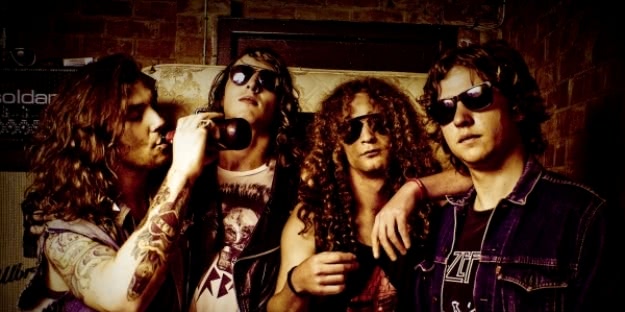Speaking to Dead City Ruins frontman Jake Wiffen, you get the impression these guys might just be the hardest-working band in Australia.
The Melbourne hard rockers spend six months of every year slaying it in Europe, followed by six months back in Australia, working seven days a week to fund their next overseas jaunt.
“That’s what we’ve pretty much been doing for the last five years, just working in Australia seven days a week, save up and then go on tour,” Wiffen says. “This time that we’re back we want to do this Homecoming Tour around Australia and then record our third album, and then we’ll do another Australian tour to release that. Once you’ve got a new album, the tour cycle starts again – we’ll do a home tour, then a Europe tour, then we will try and get to the States, then you come home for summer and you do another tour. It just keeps going.”
Dead City Ruins’ current tour includes a number of dates in regional Australia. Wiffen explains that the band doesn’t usually have the time to tour these areas, but made the effort this time around in order to gauge the current state of the Australian hard rock scene.
“We’ve toured all through Europe, Indonesia and Dubai, but we’ve never done a [regional] Australian tour. People ask me, ‘What’s the scene like back home in Australia?’ and really all I can talk about is Melbourne, Sydney and Perth because they’re the only places we’ve played. Playing rural areas is pretty important for me in terms of checking the climate of hard rock in Australia, because you can see if people are coming to shows and if there’s still a bit of excitement about rock’n’roll in those smaller towns. At one time, these towns were the bread and butter for bands, where they played to crowds that really loved it, and fans made a huge effort to get to those smaller shows.”
The Australian hard rock/metal scene is a fickle one in comparison to the likes of Europe, where Dead City Ruins have found success much easier to achieve. Wiffen puts this down to Europe’s long-standing heritage of heavy music.
“A lot of bands are from there, and they’ve got huge festivals and there’s a lot more venues to play, so bands can go there and play 20 shows in 20 days, and only have to drive three hours in between shows. Whereas Australia has such long drives, and there aren’t as many places to play, so it’s really hard to keep up appearances and to keep people coming out to the tours. Simply, in Europe they have a lot more places to play and a lot more people to come out. In Australia, a lot of the smaller venues are shutting down, but Europeans have a bit more money to spend on merch, beers are cheap, and it’s always cheap to get into a gig over there.”
It’s hard not to get the impression Wiffen is slightly dispirited with the Australian music industry and the vast differences that exist between the scenes at home and abroad. At the same time, he is quick to acknowledge the unique challenges Australia faces.
“Right now, not only in Europe and America, but also Australia, there are some of the greatest bands that I’ve heard in my lifetime. There’s a really strong scene of musicians coming out in every genre, from pop to folk to black metal. The hard thing is, you go to Europe and places like Germany and Sweden and Norway – they have great bands, but they also have a great industry: they have record labels, they have radio stations, they have managers, they have people that are really interested in picking new bands up and supporting new bands and making sure they can get out and tour. Whereas in Australia, we have an industry built out of triple j, and that seems to be the only thing that gets pumped out to the kids and to the public, and this has an effect on the kind of music that people write, because a lot of upcoming artists think, ‘If I’m going to be able to play shows, then I’m going to have to [play] this certain type of music,’ which is absolute bullshit.
“I think Australia is a hard market for anyone who wants to do something triple j doesn’t think is popular or cool, but I urge every musician in Australia to look further than Australia. There’s a big world out there, there’s a lot of opportunities, and you can’t let mainstream Australian media force you into playing what they want to hear. Musicians need to get out there and go somewhere else.”
For now, Dead City Ruins will keep doing what they do best – busting their arses touring and recording, with plans to release their new album in 2016. The band has been described in the past as “young broke kids who don’t give a fuck except to play music in front of people”, and this couldn’t be more true today.
“I think touring for five months is equivalent to five years’ worth of life,” says Wiffen. “The ups and downs are crazy – it’s such a roller coaster – but at the same time, we’re all dedicated to doing this, and if you find something in life that you really want to do, whether it’s music or becoming an engineer, it’s going to be a grind, but you’re doing it because you love it.”
Dead City Ruins play Frankie’s Pizza on Sunday December 27, and the Captain Cook Hotel on Friday January 8. Information for the show at Frankie’s is available here, and for the Captain Cook hotel here.

































